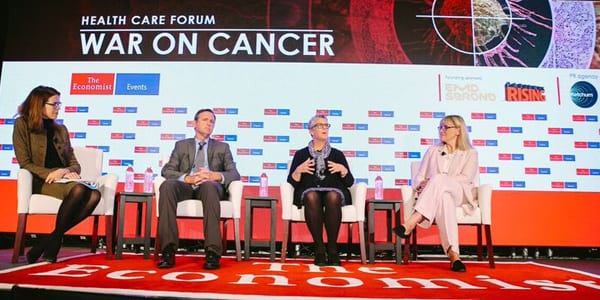
Ketchum recently supported The Economist Events team as the PR agency for their second annual War on Cancer Forum: Scaling Progress. The event brought together patient advocates and cross-sector experts from technology, finance, analytics, policy, medicine and more for a full day of brainstorming, dialogue and debate.
As a health communicator, sitting in a room with leaders from such diverse backgrounds served as a critical reminder on the counsel we need to provide: When we advise on strategy and craft communications campaigns, we need to advocate for and put into practice more integrated, cross-sector approaches to PR. This is especially crucial in healthcare.
This year’s forum had a central question predicated on the understanding that collaboration will drive success: “Will small steps or giant leaps yield the highest returns in the ‘War on Cancer’?” The answer to this question was addressed from multiple perspectives, with panel topics ranging from empowerment through numbers and the impact of data, communications, social media, and technology to health outcomes and the role of the patient. In the end, the call-to-action was evident:
We need a moonshot. Globally, cancer is still among the leading causes of death and today, high drug costs and barriers to access are among our toughest challenges.
We need incremental gains. Life-saving advances have been made especially in the last decade when it comes to cancer prevention, detection and treatment. We have to learn from and build on them.
We all have to simultaneously and without hesitation take a very human step and a Herculean leap toward curing cancer. For us to someday realize this however, progress can and has to be scaled. Here’s how we can start and, as communicators, some of the counsel we can provide to our clients:
- Collaborate, especially with those whose disciplines are not our own. “The cure for cancer is not going to come out of a single lab,” Howard Krein, Chief Medical Officer, StartUpHealth. We all have to contribute to progress whether big or small and as Greg Simon, Executive Director, Cancer Moonshot Task Force said: “We are asking everyone to create their own moonshot.”
- Democratize data. Kathy Giusti, founder of the Multiple Myeloma Research Foundation said the “democratization of data” is central to keeping online patient communities connected and informed which leads to greater access and improved outcomes in the long run. Additionally, “data needs to be organized, and made consistent and credible in a way that’s rapidly analyzable,” Amy Abernethy, Chief Medical Officer and SVP, Oncology, Flatiron Health.
- Be human. Remember that “patients are not averages, they’re individuals.” Patient advocate Eliza Adams gave this strong reminder that when dealing with the disease multitudes that is cancer, we have to keep it personalized and personal.” An engaged patient wants health not healthcare,” said Sanjeev Arora, Director and founder, Project ECHO.
- Allow conversations to get uncomfortable and get real. “We are having a conversation on budgets disguised as a conversation on value,” Josh Ofman, SVP, global value, access and policy, Amgen. Pricing, cost and access are major obstacles and if we are not having honest conversations on this problem, we will not find realistic solutions.
- Find the box and think outside of it, on top of it, below it and everywhere but inside it. One of the most vocal discussions last week was around progress made to date with immunotherapies and how a decade ago it was seen as the last thing to spend your time on. “You have to be a touch crazy and believe, maybe it will work,” Peter Kolchinsky, Founder, portfolio manager, managing director, RA Capital Management.
Perhaps my top takeaway from this day-long gathering, and something we all need to do a better job at communicating, is that we all play a role in scaling progress in the War on Cancer.